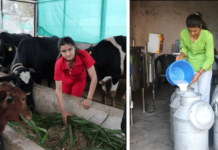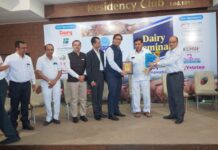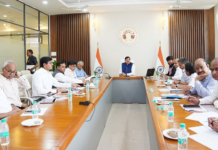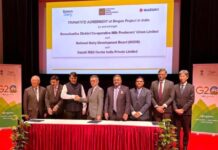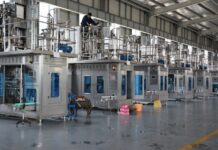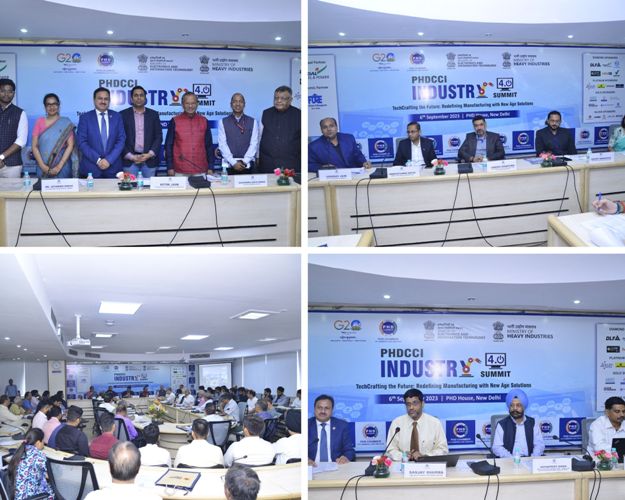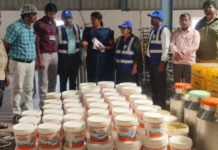New Delhi, September 07, 2023: PHDCCI, held its Industry 4.0 Summit today at its headquarters, with the theme “TechCrafting the Future: Redefining Manufacturing with New Age Solutions.”
Shri Nagendra Nath Sinha, Secretary, Ministry of Steel, Government of India, discussed the significant contribution of the Indian steel industry to the economy, accounting for over 2% of the country’s GDP. He emphasized that Industry 4.0 is poised to profoundly impact this sector, benefiting the Indian Steel Industry and MSMEs while opening up global opportunities. He asserted that the Indian steel sector has undergone remarkable transformation, with rapid production escalation propelling India from the third-largest to the second-largest global crude steel producer in just four years.
Furthermore, Mr. Nath urged the Indian steel industry not to limit itself to the domestic market but to explore global opportunities, particularly for secondary steel players. He mentioned numerous avenues, including Consultancy, Training, and Networking available at institutes like the National Institute of Secondary Steel Technology, Ludhiana, and Biju Patnaik National Steel Institute, Bhubaneswar, operating under the ministry’s purview.
He acknowledged the rollout of 5G technology and the use of drones for nuclear imaging technology as the greatest innovations in the Industry 4.0 realm. In the same vein, he communicated that one of the biggest challenges for making Indian MSMEs 4.0 compliant is the lack of a skilled workforce. From his standpoint, the influence of global factors on steel prices, finding the right balance between producing high-quality steel and keeping costs down to compete globally, becoming sustainable, and the need for modernization are the important determinants for the burgeoning Indian steel industry.
Shri Vijay Mittal, Joint Secretary, Ministry of Heavy Industries, Government of India, stated that the Ministry of Heavy Industry serves as the nodal ministry for Industry 4.0. It has recognized the global momentum around this concept and its necessity for India. The ministry has developed a scheme aimed at enhancing competitiveness by establishing Smart Advanced Manufacturing and Rapid Transformation Hub (SAMARTH) centers, which have begun their efforts to advocate for Industry 4.0. Currently, over 70,000 MSMEs and industries have registered with the four SAMARTH centers. He emphasized the urgent need to transition from conventional industry to Industry 4.0, especially for MSMEs. Finding cost-effective solutions to convert traditional manufacturing systems into advanced ones that provide real-time insights into processes, quality, and other factors are the mainstay for MSMEs to become Industry 4.0 compliant, he shared.
Shri Nitin Jain, Co-Chair, New Age Business Committee, PHDCCI & Co-Founder, Ofbusiness, affirmed that big OEMs are already Industry 4.0 compliant; hence, there is a need to focus on how MSMEs can transition into Industry 4.0. India, as a nation, is producing 120 MT to 130 MT of steel every year. This production has been increasing due to a surge in demand since 2014-15, driven by infrastructural facilities and more manufacturing processes in the economy, he said. In the same cadence, he added that as the country is self-reliant in meeting its steel requirements, there is a need to leverage the potential of Industry 4.0 to enhance our steel exports; at the same time, the high cost of raw materials and industries’ slow adoption of Industry 4.0 are a few challenges that the industry is confronted with. The need of the hour is to invest in new age technologies that yield long-term results, he asserted.
The Vote of Thanks was delivered by Shri Ravi Gupta, Co-Chair, Minerals & Metals Committee, PHDCCI. He discussed how Industry 4.0 has altogether changed the way we manufacture. It has significantly reduced the costs and enhanced quality through the use of automated processes, thus fostering a new age of efficiency and innovation.
These new age technologies ensure a safe working environment and safeguard systems from potential breaches. It facilitates companies in informed decision making i.e. adjusting production lines and responding to market changes. Industries that embrace Industry 4.0 position themselves in a favorable way to adapt to the future and to actively shape it, added Shri Gupta.
Lastly, he thanked all the industry stakeholders, policy-makers, technology providers and academicians who have spared their valuable time to join the summit on this timely theme.
The session was moderated by Dr. Jatinder Singh, ASG, PHDCCI.
The Summit was sponsored by Jindal Steel and Power Ltd., while Fore School of Management was the Summit’s academic partner, and supported by PHDCCI annual sponsors, DLF Ltd; Jindal Steel & Power; KLJ Group; Multani Pharmaceuticals Ltd; Marble City; MMG Group; Radico Khaitan Ltd; Uflex Ltd; Vestige; Eazy ERP Technologies; JK Tyre & Industries Ltd; Sagar Group of Industries; Superior Industries Limited; Samsung India Electronics; Oswal Greentech; Apeejay Stya Group; Blossom Kochhar Beauty Products Pvt Ltd; DCM Shriram; R E Rogers; Trident Group; Ajit Industries Pvt Ltd; Bhagwati Plastic and Pipes Industries; Central Coalfields Ltd; DD Pharmaceutical Ltd.; Hindware Sanitary; Jindal Steel; Modern Automobiles; P S BEDI & Co.;
Corporate Comm India (CCI Newswire)




